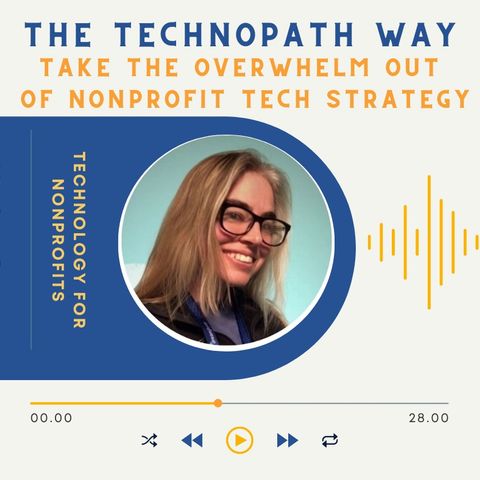Kick Imposter Syndrome to the Curb

Descarga y escucha en cualquier lugar
Descarga tus episodios favoritos y disfrútalos, ¡dondequiera que estés! Regístrate o inicia sesión ahora para acceder a la escucha sin conexión.
Descripción
Never miss an episode or recap again! Sign up for our weekly newsletter, The Technopath Way Tips, here: https://www.http://technopath.ac-page.com/the-technopath-way-sign-up This week on The Technopath Way we’re tackling a topic that’s...
mostra másThis week on The Technopath Way we’re tackling a topic that’s been on our minds a lot lately: Imposter Syndrome. What is it, where does it come from and how can we overcome it? Many people suffer from a lack of confidence around their careers or jobs, and a big part of why Sarah formed Technopath was to support and mentor people in their nonprofit Salesforce careers. So this week’s topic is one that she encounters often from Accidental Admins who aren’t sure they’re actually qualified to be using their organization’s Salesforce org, to seasoned Salesforce Consultants who are stumbling when it comes to their nonprofit clients.
Here are some things an expert at the Imposter Syndrome Institute said we can do to cure imposter syndrome in ourselves:
1. Break the silence. Shame keeps a lot of people from “fessing up” about their fraudulent feelings. Knowing there’s a name for these feelings and that you are not alone can be tremendously freeing.
I’ve also been thinking about whether or not being able to label this feeling imposter syndrome is useful or a detriment...not sure.
2. Separate feelings from fact. There are times you’ll feel stupid. It happens to everyone from time to time. Realize that just because you may feel stupid, doesn’t mean you are.
This is especially true for you out there that are trying to grasp a new technical or even business concept. You can figure it out, it may take more time.
3. Recognize when you should feel fraudulent. A sense of belonging fosters confidence. If you’re the only or one of a few people in a meeting, classroom, field, or workplace who look or sound like you or are much older or younger, then it’s only natural you’d sometimes feel like you don’t totally fit in. Plus if you’re the first to achieve something in your world (first VP, astronaut, judge, supervisor, firefighter, honoree) there’s that added pressure to represent your entire group. Instead of taking your self-doubt as a sign of your ineptness, recognize that it might be a normal response to being on the receiving end of social stereotypes about competence and intelligence.
5. Accentuate the positive. The good news is being a perfectionist means you care deeply about the quality of your work. The key is to continue to strive for excellence when it matters most, but forgive yourself when the inevitable mistake happens.
6. Develop a healthy response to failure and mistake making. Henry Ford once said, “Failure is only the opportunity to begin again more intelligently.” Instead of beating yourself up for falling short, do what players on the losing sports team do and glean the learning value from the loss and move on reminding yourself, “I’ll get ’em next time.”
Right the rules. If you’ve been operating under misguided rules like, “I should always know the answer,” or “Never ask for help” start asserting your rights. Recognize that you have just as much right as the next person to be wrong, have an off-day, or ask for assistance.
7. Develop a new script. Become consciously aware of the conversation going on in your head when you’re in a situation that triggers your Impostor feelings. This is your internal script. Then instead of thinking, “Wait till they find out I have no idea what I’m doing,” tell yourself “Everyone who starts something new feels off-base in the beginning. I may not know all the answers but I’m smart enough to find them out.”
8. Visualize success. Do what professional athletes do. Spend time beforehand picturing yourself making a successful presentation or calmly posing your question in class. It sure beats picturing impending disaster and will help with performance-related stress.
9. Reward yourself. Break the cycle of continually seeking and then dismissing validation outside of yourself by learning to pat yourself on the back.
10. Fake it ‘til you make it. Now and then we all have to fly by the seat of our pants. Instead of considering “winging it” as proof of your ineptness, learn to do what many high achievers do and view it as a skill. The point of the worn-out phrase, fake it til you make it, still stands: Don’t wait until you feel confident to start putting yourself out there. Courage comes from taking risks. Change your behavior first and allow your confidence to build.
P.S. Have you seen our Nonprofit Cloud Consultant Exam Study Guide? Expert guidance, step-by-step visual instructions and comprehensive video explanations help prepare you to take the Nonprofit Cloud Consultant Exam with confidence. Check out a free preview here: https://coda.io/d/NPSP-Study-Guide-Preview-by-Technopath_dB7GHMLpEhi/Overview_su0UH
Información
| Autor | Sarah Epting |
| Organización | Sarah Epting |
| Página web | - |
| Etiquetas |
Copyright 2024 - Spreaker Inc. an iHeartMedia Company

